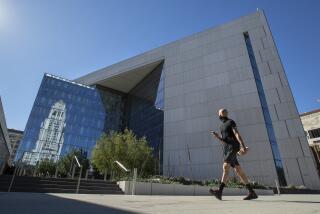A LOOK AHEAD * Mayor Riordan and others hold a community forum to inform Angelenos about why an accurate census count in 2000 is vital to the city’s future, as. . . : L.A. Wants Tally, Clout and Funds to Add Up
- Share via
It is one of the oldest endeavors undertaken by civilized societies and still one of the most problematic.
The census, or counting of the population, has sparked violent uprisings from its inception in biblical times, when it was used as a means of apportioning land and levying taxes.
Although the 1990 census failed to spur insurrection, it prompted plenty of controversy and derision when the U.S. Census Bureau admitted that it missed counting more than 8 million people, most of whom were minorities, immigrants or poor city dwellers.
As the 2000 census draws near, Los Angeles politicians and community groups fear that the undercount will be repeated with calamitous consequences for federal funding of local services. Those fears were addressed at a community forum Wednesday evening at the Museum of Tolerance, attended by Mayor Richard Riordan, Councilman Mike Feuer, census officials, academics and community action groups.
The event was sponsored by the mayor’s Census 2000 Outreach Project and the Community Newspaper Council, a coalition of ethnic and community-based newspapers.
The tone of the meeting was set by Riordan, who said the city’s effort to ensure that all residents are counted is critically important.
“Besides federal dollars, our representation in Congress is based on the census count,” Riordan said.
In California, the 1990 undercount of more than 800,000 people cost the state one congressional district and millions in federal funding for things like children’s health care, educational programs, road construction, parks and libraries.
If the 2000 census undercounts the state’s population to the same degree, more than 153,000 Los Angeles residents might be missed and the city could lose $238 million in funding, experts said.
The 2000 census questionnaires will be mailed to Southern California households in March to gather a variety of information on the sex, age, race, ethnicity and housing status of residents.
For census officials, establishing an accurate mailing list is a key goal and they have vowed to do a better job this time around, using community-based organizations and local experts to help compile information.
The Census Bureau also attempts to find people who do not live in the usual places, and its 2000 effort at least appears to be exhaustive.
Census takers will interview people at fairs, carnivals, marinas and campgrounds. They will seek out migrant and seasonal farm workers and will work with the Department of Defense and Coast Guard to identify people living on military installations and ships in the United States as well as overseas.
Questionnaires will be distributed to people in group homes, dormitories, youth hostels, convents, monasteries, halfway houses and jails. There will be local help centers and a toll-free number for those having difficulty filling out the form.
But a major theme of last week’s discussion was whether federal authorities can overcome the problems that resulted in the serious undercount of minorities, immigrants and homeless residents in 1990.
Reasons for their underrepresentation are varied. Many minorities are poor and cannot be reached by telephone to determine their location. Others live with extended families in overcrowded homes where fear of eviction may forestall cooperation. And many immigrants, concerned about deportation or suspicious of government in general, may not respond or may underreport their own households.
Kathay Feng, an attorney with the Asian Pacific American Legal Center, said some Japanese Americans are under the misperception that during World War II, the Census Bureau shared names with military authorities, leading to the internment of many members of their community.
Independent research, Feng said, concluded that no names were exchanged. And Kem Worley, assistant regional census manager, said there has never been a proven breach of confidentiality.
One spirited discussion involved efforts to count the homeless, one of the most severely criticized components of the 1990 census. The Census Bureau never provided an official homeless count, leading Michael Neely, director of the Homeless Outreach Program, to proclaim: “According to the U.S. census, homeless people do not exist.”
Neely and others criticized plans to conduct the 2000 homeless count between 4 and 7 a.m., when it is presumed most can be reached in shelters. But many experts noted that the living arrangements of the homeless in Los Angeles pose unique problems. Many are well-hidden in abandoned buildings, are scattered in encampments or stay by themselves under street overpasses or bushes over a vast stretch of the city’s geography.
“We certainly are not going to be able to find and count everyone between 4 a.m. and 7 a.m.,” said Natalie Profant, planning manager for the Los Angeles Homeless Services Authority. “We have some real issues with the way the methods are being prepared.”
Worley defended the agency’s efforts and said it has learned from its mistakes. Besides shelters, the bureau has identified soup kitchens, mobile food vans and outdoor locations to conduct counts. He said the agency is constrained, moreover, because Congress sets much of its agenda.
“We are going to work with advocates on ideas and places; we’re asking for help,” Worley said.
The bureau is continuing to analyze and revise procedures almost until the time of the count. Authorities recently dropped requirements that census employees and enumerators be citizens, a major change, that will benefit Los Angeles, Worley said.
And the 2000 forms allow for a more complete racial and ethnic accounting of households. Spurred by the vocal concerns of people claiming mixed-race ancestry, new entries permit residents to identify themselves as one or more of 14 distinct ethnicities or to choose whatever other race they would like to be considered.
More to Read
Sign up for Essential California
The most important California stories and recommendations in your inbox every morning.
You may occasionally receive promotional content from the Los Angeles Times.














